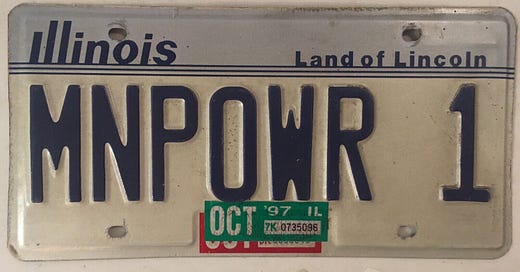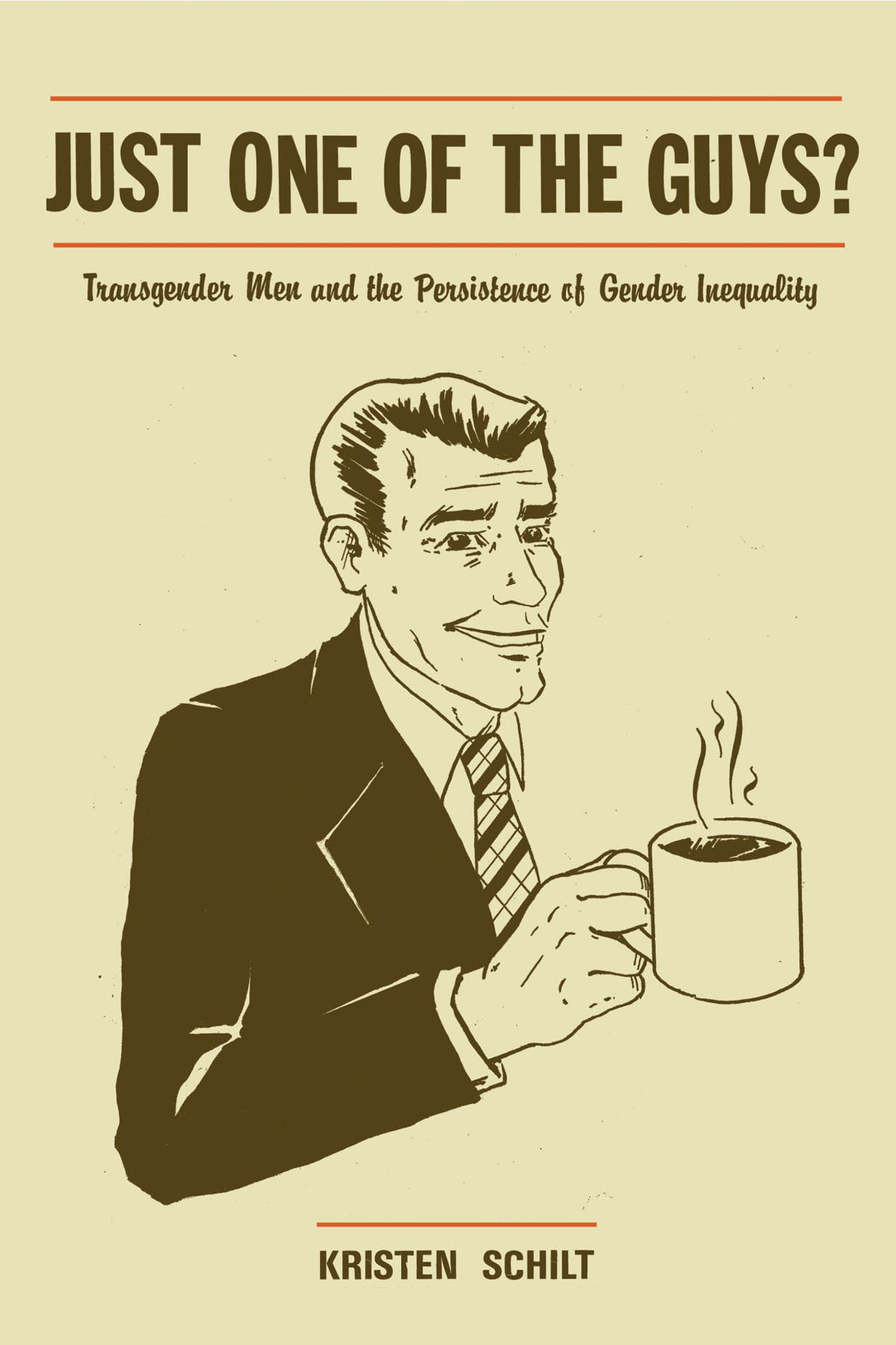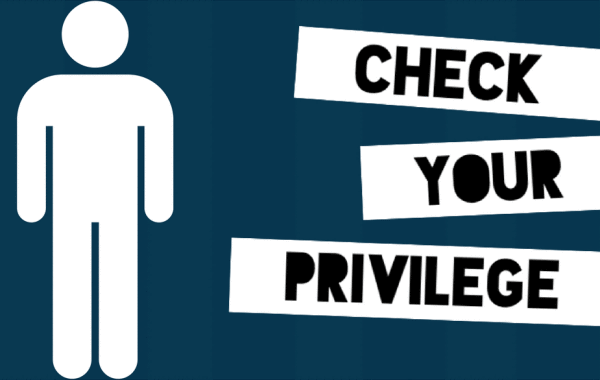Today’s episode includes an audio transcript. This is the first time I’ve used this feature, and I’m excited about the accessibility it provides. If you’ve got a feeling about it - good, bad, indifferent - I’d love to hear your feedback in the comments.
It was not in my plan to get any special kind of privilege by outing myself as a white male in modern America. For real. It didn’t even cross my mind when I was busy having epic panic attacks about what it means to be transgender, how I’d talk to my wife about it, how I would come out to my kids or my extended family or my coworkers or friends. At no point was there any hint of male privilege in my mind. In fact, a big thing that held me back from coming out was my all-out aversion to toxic masculinity, the unreal power that men are given in western society, and the abuses committed through that power. I didn’t want to take part in it. I didn’t want to be complicit.
I was deeply ashamed of being male because of those problems. And I still haven’t quite come to terms with those feelings or what to do with them.
But let’s get very real for a moment. At this point in my transition I do not pass as male very often. There are looks I get from others that make me know they are struggling to assign a gender to me in passing, and so the result is hit or miss (okay, the real joke is “mister or miss”).
I’m way more worried about making it in and out of public restrooms safely than anything else.
In my desire to delve into my gender transition with data and science and a wholistic understanding of literally everything I could get my hands on, I picked up a book from my local library about the subject of male privilege for transmen. And rest assured, it was fascinating.
Just One of the Guys?: Transgender Men and the Persistence of Gender Inequality, by Kristen Schilt.
Cliff’s notes version? Yes, it is absolutely, verifiably true that men receive privilege for simply being male. Schilt’s book uses interviews with a variety of transmen in the United States who either transitioned in the workplace at the same job or moved to new jobs after transitioning, and in nearly all of those cases they were welcomed in as “one of the boys” by cismen in their workgroups. They were given more room to speak, more opportunities for advancement, and more credit for knowing and doing less.1
Scientifically, this kind of interview-based data analysis is fascinating, and it should be validating to every woman (cis and trans) and female-socialized person who reads it; It’s not in your head. You’re not making this up. Sexism is real.
Interlude
Growing up as a closeted transmasculine person means that my experience with gender and the assumptions around my own gender are very different than what a cisgender person goes through. While I was female socialized, I never fit into feminine expectations. I have always behaved more in line with my male peers, and that’s led to a lot of struggles with authority figures and a ton of frustration for me. Because of this, in the ways in which I’ve been perceived as masculine, I know that I have benefitted, just as I know that I have been punished.
It also goes without saying that I cannot speak to the experiences of transwomen and transfeminine people, nor should my words be reversed to somehow fit for them. Their perceptions and understanding of male privilege will differ greatly from my own, as do the penalties they face for transgressing gender as children and adults.
Society can learn a lot about gender roles and privilege by listening to transgender people. Of all the people in the world, we are the best at examining life from both sides of the gender binary because we have seen and experienced these things firsthand.2
On the job training
A few years back, I traveled to a user convention put on by a software application vendor. For two days prior to the convention I was in training for a very specific aspect of the application that few users get the opportunity to learn about. It’s powerful stuff, and it has become part of the secret sauce in my everyday work. And when it happened, I was still presenting in girl-mode. No one knew I was a man (including myself, really). I wore that training and experience as a badge of honor, and I used it to customize my current job into what I wanted it to be.
As the years wore on, I leaned on that education more and more, and a few other folks in and near my workgroup started to pick up aspects of it as we worked together. Some of them trained with me briefly to get the main concepts down, and we collaborated often. But realistically, I was the only power user in any of these groups to have this knowledge, and I was asked for that work more and more frequently as business needs called for data extraction and analytics.
Fast forward to current times, and a new opportunity arose. The application vendor would be onsite and was offering this same training again. This time, however, more folks from my organization could take part. And still, somehow, my name was put forward as a “must go” attendee.
I had not asked for this training.
Heck, I don’t even think I need it. What do I stand to gain? Will it refine my skills more? Place me even further ahead of my colleagues? Reinforce the idea that I am the go-to person for this work forever?
In the midst of this personal struggle, I must note that other coworkers reached out to me with their frustration at not being able to attend that training. There were only two seats, it turned out, and I was in one of them. The other attendee was also a white male. And the last time I got this training, the only other colleague to attend with me was a (drum roll please) white male. The second guy this time around is one of the other users I have already trained. And he’s also gotten some training from another person in the workgroup who learned from me and did his own exploration to get good at this stuff.
Go on. Guess what he looks like.
Here is the lineup. Two coworkers, both cishet white men, one from my small workgroup, the other from an adjacent group. And then me, the trans white man. Three white men in power-user-level training. Taking up three seats.
It would be so easy for me to justify how we all got here. I could tell you plenty of things that you could nod and smile about; how we have all ‘worked hard’ to teach ourselves things; how the baseline demographic in this type of work is mostly white anyway; how we are a government agency and so there is no gender pay gap. I could even tell you, very convincingly, that I got my initial training as a woman3, and isn’t it very forward-thinking of my boss to put my name forward as a transgender employee?
The rest of my workgroup, however, deserves a moment in the limelight. Of the six of us, two are ciswomen, both queer, both white. Two of the cismen are immigrants, both Muslim, one Black, one white. We have diversity. We represent a lot of places and cultures.
And yet two white men end up in the high-level training again.
There is no profound solution to this situation that can be done from my level in the organization. When I called this problem out to my boss, I was assured that they only wanted the best for our entire group.
“This isn’t equitable,” I argued. “The three of us selected have already had a lot of exposure to this stuff. We use it all the time. I’d like to see my coworkers get access to this kind of training, to help them gain some skills and open up the option of different work. We should all get the chance to improve ourselves."
"So you’re saying you don’t want this training?” my boss asked in an incredulous tone.
“Precisely. Would you please ask my coworkers if one of them wants my seat?”
I also tried to point out that the other two white men in the training had no business taking up those spaces, but my argument fell on deaf ears. My seat, however, has been reassigned to someone who needs it far more than I do, and so that’s not nothing.
Do I have male privilege?
I really don’t know. I can’t say that it was – or was not – a motivator in being assigned a work opportunity that I don’t deserve or need. Maybe my boss still thinks of me as female. Maybe she was trying to be nice to the transguy. Maybe she thought I belong there since this is the work I do.
Maybe she didn’t think about it at all.
Maybe that’s the entire problem. Maybe this privilege is so insidious that it runs alongside us, invisible, intangible, inevitable. But I know that I saw it before my transition, back when the world was pitted against me for being born a girl. And, like a lot of female-socialized people , I’d watched enough Ted talks and read the right books to know that those feminine qualities were holding me back from being heard. And so I schooled myself in all the ways to succeed.
Leave emotions out of your statements.
Don’t let your voice rise at the end of a sentence. If it’s not a question, don’t make it sound like one.
Never begin with “I’m sorry, but” if you want to be taken seriously.
Take up space. It won’t be given.
Be smarter than everyone else in the room if you want them to listen. But don’t make anyone else feel stupid.
Never cry where they can see you.
Make it sound like it’s the boss’s idea.
Work harder and expect nothing from it.
When they give the promotion to the men, smile and say something nice about how hard they worked for it.
I can’t leave those lessons behind me. They’ve become part of who I am. They’re the armor I wear into meetings and interviews, and I have no idea how to let go of them.
But if I truly have male privilege now, will I know it when I see it? Or will I believe that I worked hard to get that next promotion? Will I still see the other folks around me not getting opportunities? Not getting recognition? Not getting a seat at the table? And is this why those two other men never considered giving up their seats in that training opportunity? How do they view this?
Manpower?
Really, ask any of my previous bosses or supervisors. I’m the guy who says that one thing that they probably don’t want to hear. I’m the one who has challenged the use of the word “manpower” for the last ten years in every meeting, email thread, or conversation I find myself in.
Imagine, if you will, a gathering of about thirty important people in a large room at the downtown office building, and me, among them. All of us sat and listened to the big boss share his wisdom. And right at the end of his speech, he used the word “manpower.”
I raised my hand.
“Yes, Robin?”
“I think you meant to say ‘workforce’ just then. ‘Manpower’ is really outdated, and half the people in this room are not represented by your word choice.”
Stunned look, small grin, “Well, you know, it’s just a term.”
“No problem,” I grinned back. “Just – if you would – try saying ‘womanpower’ or ‘ladypower’ or even ‘girlpower’ in place of it, and see how that rolls off your tongue. It’ll probably feel really awkward. Like hearing ‘manpower’ from the guy in charge. And then try ‘workforce,’ and feel how reasonable and easy it is.”
While I didn’t have any male privilege back then, I didn’t end up in my boss’s office to face the consequences of backtalking. But I’m sure they were just humoring me, laughing at how ballsy I was to say that in such a big meeting. When I got back to my desk, I had a conversation with my coworker, a man, who had really enjoyed the show in that meeting. He chuckled about it, about the look on the manager’s face, about the reaction in the room. And then he said, “I’m not really sure workforce is the right word anyway. So forceful.”
“You got a replacement?”
“Yeah,” he laughed, “human frailty.”
And that one has made me smile for the last five years anytime I hear ‘workforce’ from folks.
We’re not all born to challenge the system, but it’s clear that I prefer to run against the grain in many ways. I hope this continues to be one of them. And, true to form, a few months into my transition, one of my coworkers asked if I was still going to confront the use of the word ‘manpower’ since I was now identifying as a man.
“Well… yes. Obviously. It’s no more appropriate now than before. Me being a man has nothing to do with that.”
And she smiled at my response.
Your trans friend,
Robin (the frail human)
They also got let in on all the rude, crass humor that men seem to favor. And wow, what a conflict that creates!
You might also want to check out Paula Stone Williams’ book, As a Woman.
Wow, I always throw up in my mouth a little when I use that word to describe myself.








An interesting essay Robin. It's so good to know that even though women liberated themselves back in the 70s, someone forgot to tell the guys.
Such a good article, and I like the voiceover. Your delivery was spot-on. I've attempted a couple of these on mine as I want to make it accessible for those with vision or other issues, and it's hard to get the pacing et al just right. I've not explored podcasts yet either but I think hearing our voices helps make us more 'real' as humans too, you know?